These days, everything is made possible by databases. Data is saved and retrieved as needed, whether it’s for online purchases or to recover your favorite songs.
Are you a business owner always looking for the most reliable tools to manage your applications, system storage, and Data? Selecting the right database management system (DBMS) is crucial for business owners looking to optimize their applications, system storage, and data handling processes.
Two popular choices, MongoDB vs MySQL, stand out as leading contenders. Let’s dig deeper into finding out which database manager is the right choice for you, you must understand the Database Management System and how exactly it streamlines your processes.
DBMS is a software solution that simplifies data creation, management, organization, and retrieval, providing a centralized location for storage and manipulation. Its functions include security, concurrency management, and data integrity enforcement, ensuring data consistency, dependability, and accessibility across various applications. This article will provide you with a comprehensive analysis of the most popular database management system providers- MongoDB vs MySQL, let’s discuss each in detail.
What is MongoDB vs MySQL
The two database management systems are very powerful but different from each other, let’s compare in detail what features each has and how they use them differently from the other.
What is MongoDB?
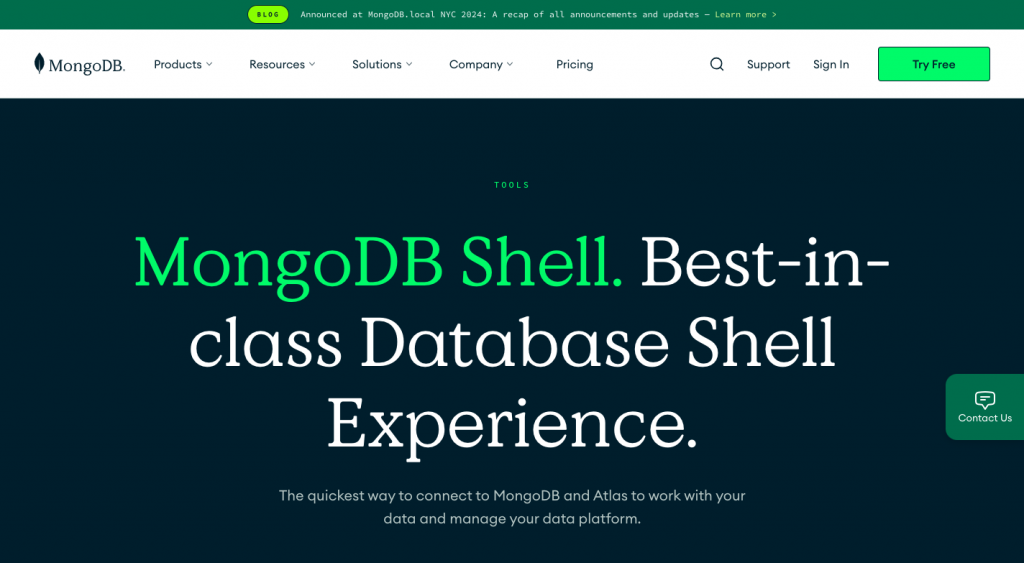
MongoDB is a powerful open-source and free-to-use non-relational database system released 12 years ago in 2009 by 10gen (now MongoDB Inc.).
Get exclusive access to all things tech-savvy, and be the first to receive
the latest updates directly in your inbox.
It keeps an extensive amount of data in the form of documents under a Public License on the Server Side. By introducing “documents,” MongoDB replaces the concept of “rows” in relational and conventional data structures. With this independence, the developers can now deal with evolving data models.
It’s simpler to deal with using MongoDB. Because schemas don’t need to be defined in advance, users with no technical expertise can start storing data in it right away.
MongoDB uses a document-oriented design to store data in different collections and documents that resemble JSON, as opposed to rows and columns. Programming languages such as C, C# /.NET, C++, JavaScript, PHP, Ruby, Rust, Scala, Go, Swift, and Python can all be used with the database. Because of the flexibility, companies can recruit developers with a variety of skill sets.
MongoDB has recently introduced MongoDB ATLAS, making it easier than ever to use MongoDB on the cloud. It allows users to manage, scale, and operate MongoDB in the cloud with just a few clicks. With MongoDB ATLAS, you can quickly access a cluster and start coding immediately. It also facilitates seamless data migration, allowing integration with platforms like MySQL to BigQuery or popular cloud storage solutions like Amazon S3. Edited
LATEST VERSION: MongoDB 4.2 (February 2020)
Companies like Twitter, IBM, Oracle, Zendesk, Citrix, Sony, Intercom, HTC, and others are all using MongoDB.
What Is MySQL?
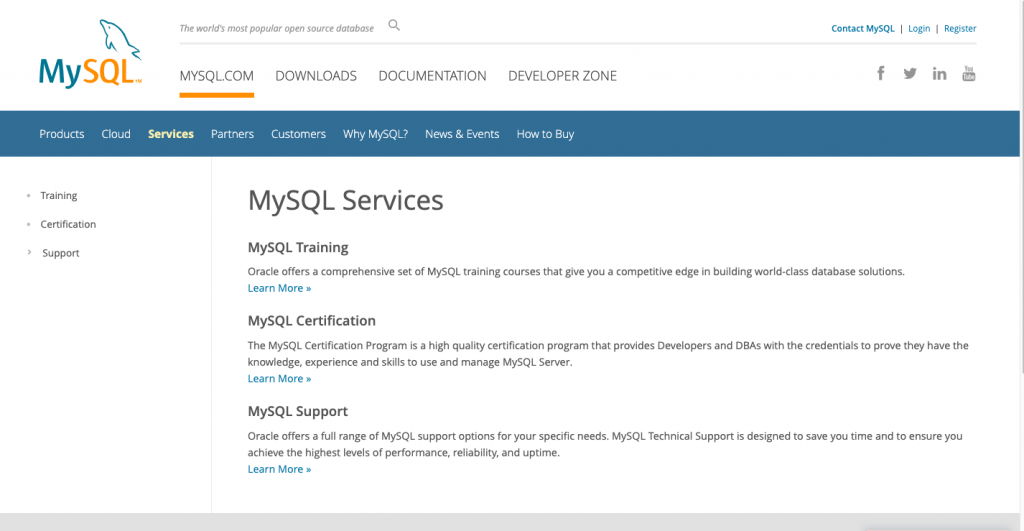
MySQL relies on SQL Query language, so even if a developer is unfamiliar with MYSQL, they won’t have much trouble catching up as SQL is an easy language to master.
It has two main components: A type of storage engine and the language used to work with data. The storage engine is where data is created, retrieved, sent, and stored. The language is how to access it.
MySQL keeps your data safe with Access Control Lists (ACLs), which prevent unauthorized users from accessing or making changes to the database. It also secures your data when it’s sent between your computer and the server using TLS (Transport Layer Security), even over the internet.
Saves your data so it doesn’t get tampered with or lost. If you’re using MySQL Enterprise Edition, you get even more protection. You can hide sensitive information like credit card numbers or ID numbers so that only certain people can see them.

LATEST VERSION: MySQL 8.0.21 (February 2020)
Companies like Airbnb, NASA, Sony, YouTube, Netflix, Pinterest, Drupal, Joomla, and more are all using MySQL.
MongoDB vs MySQL Database System: A Thorough Comparison
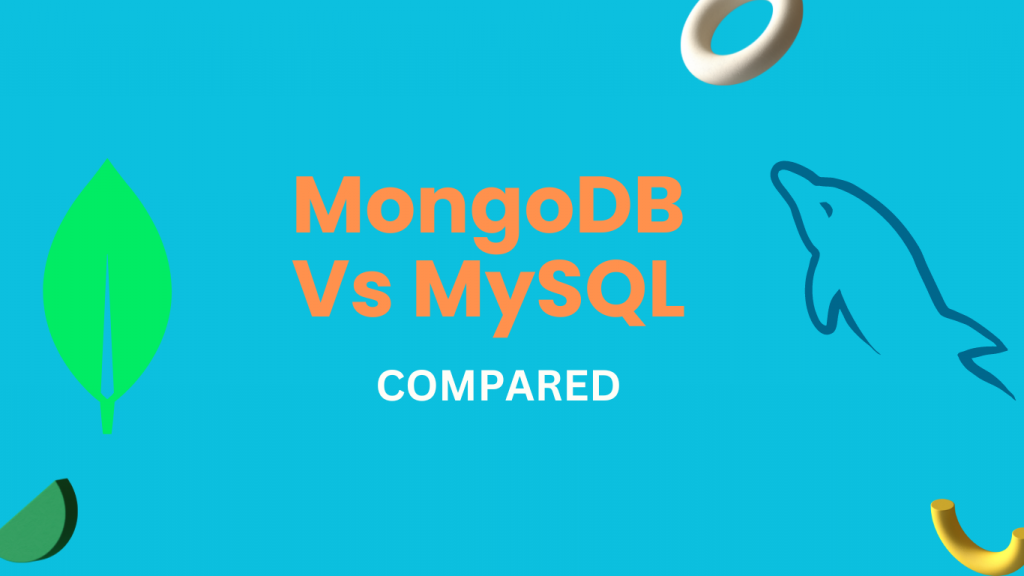
Here’s a detailed MongoDB vs MySQL comparison for you, how each feature is different in the two database management systems.
MySQL is a legacy table-structured system, whereas MongoDB is a document-based system.
MongoDB vs MySQL: Scalability
The two DBMSs MongoDB vs MySQL need to be smoothly scaleable to accommodate changing requirements. Additionally, users may not enjoy using your application if it saturates crashes, lags, and goes down frequently. No one enjoys using such systems, and they can move on to other options sooner rather than later. Let’s compare scalability in both.
MongoDB
MongoDB is extremely scalable, making it popular for growing websites, CMS systems, and e-commerce stores.
Offers horizontal scalability, achieved through sharding. Sharding enables higher throughput operations and the management of large data sets. Dividing data among several collections and processors helps higher throughput operations and large-scale data management which as a result automatically maximizes disk space utilization and offers dynamic load balancing.
MongoDB supports range-based sharding, transparent query routing, and automatic distribution of data volume for efficient data partitioning. It provides flexibility in scaling by allowing the creation of multiple server clusters, offering higher write and read performance for applications of different scales.
MySQL
In a MySQL database system, the available options for scaling are limited. You can choose from these options: Vertical scalability by adding more resources to the current database server or read replication by creating read-only copies of the database on other servers.
MySQL primarily offers vertical scalability, allowing you to increase the load by improving the RAM or CPU specs on a single server. It provides fewer horizontal scalability choices compared to MongoDB, such as read replicas and clustering, but with more limitations. For instance, read replication is restricted to a maximum of five copies, and replicas may lag behind the main copy, leading to performance issues at scale.
Although MySQL offers sharding techniques such as Automatic sharding and MySQL Fabric, their deployment is restricted due to various obstacles. Implementing sharding in MySQL requires careful consideration of schema modifications and the mapping between data divisions, sharding keys, nodes, and databases.
MySQL offers less scaling flexibility, with limited horizontal scaling options and a heavier reliance on vertical scaling. Vertical scaling has an upper limit and may not be as cost-effective for large-scale applications.
MongoDB vs MySQL: Security
Let’s explore how Security differs in the MongoDB vs MySQL database management systems.
MongoDB
MongoDB has robust security features as well. A notable security component of it is role-based access. Users can be assigned various roles and corresponding rights. Apart from that, MongoDB uses TLS/SSL encryption for all communication.
MongoDB also has a fascinating feature called client-side field-level encryption. With this functionality, an application can encrypt document fields before submitting the file to the server. The data cannot be read unless the user has the correct encryption key. The loss of an encryption key leaves all data unreadable.
MySQL
MySQL assures you of the highest level of data protection. The database facilitates secure data transmission via TLS (Transport Layer Security) between the client and server, guaranteeing the integrity of any data obtained via an open network. The TLS protocol can also detect any data loss.
MySQL uses security based on Access Control Lists (ACLs) for all connections, queries, and other operations that users can attempt to perform. There is also support for SSL-encrypted connections between MySQL clients and servers.
With MySQL Enterprise Edition, users can now benefit from data masking and de-identification capabilities. Sensitive information, such as credit card or ID numbers, can be hidden via demasking.
MongoDB vs MySQL: Performance
Let’s explore how Performance differs in the MongoDB vs MySQL database management systems.
MongoDB
MongoDB offers multiple ways to create queries. MongoDB also gets performance praise for its ability to handle large amounts of unstructured data. Because MongoDB documents use a hierarchical data format and contain the majority of the data in one document, fewer joins between different documents are required.
Although the $lookup procedure supports joins, performance is not optimized for them. Nonetheless, MongoDB prioritizes write efficiency and provides a quick insert method via the insertMany() API.
MySQL
MySQL is designed to enact high-performance joins across multiple tables that are appropriately indexed. However, it requires data to be inserted row by row, so write performance is slower. MySQL performs well as an open-source relational database with multiple tables.
The database’s full-text indexes boost the performance of a high-speed transactional system, and memory caches that prevent you from losing crucial information or work.
MongoDB vs MySQL: Ease of Use
Let’s explore how Ease of Use differs in the MongoDB vs MySQL database management systems.
MongoDB
MongoDB is frequently considered simpler to use for developers who are more familiar with JSON or JavaScript syntax. Learners with no prior SQL expertise will find it very easy to understand, thanks to its flexible schema architecture and simple query language. Installing MongoDB is usually straightforward, and its extensive documentation and community support can assist with setup and troubleshooting.
With a query language similar to JavaScript, MongoDB is more intuitive for developers familiar with JavaScript or JSON syntax. The query language supports complex operations and can be easier to learn for developers without prior SQL experience.
Compared to MySQL, MongoDB is easier to work with. Since there is no need to define schemas beforehand, it allows users with minimal technical knowledge to immediately start storing data in it. MongoDB is compatible with various programming languages, including C, C#, .NET, C++, JavaScript, PHP, Ruby, Rust, Scala, Go, Swift, and Python. This flexibility enables organizations to hire developers with a broad range of expertise.
Also, MongoDB has now introduced MongoDB Atlas, simplifying cloud usage by enabling easy management, scaling, and operation offering quicker cluster access, coding, and data migration from popular cloud storage platforms.
MySQL
For developers who are already familiar with SQL or conventional relational database ideas, MySQL can be considered as being simpler to use. For developers used to working with relational databases, MySQL’s robust schema architecture may necessitate more preparation and schema adjustments, but it’s a well-established SQL language that it relies on so even if a developer is unfamiliar with MYSQL, they won’t have much trouble catching up as SQL is an easy language to master when working on financial or healthcare applications.
This database system is also very easy to set up. Can be easily installed and activated in WordPress. Users can take advantage of various third-party tools to establish a connection with the database.
MongoDB vs MySQL: Speed
Let’s explore how Speed differs in the MongoDB vs MySQL database management systems.
MongoDB
MongoDB generally offers faster read performance for certain types of queries, particularly those involving document retrieval or aggregation operations. Its flexible schema design and ability to embed related data within documents contribute to more efficient read operations.
MongoDB may show better speed in read-heavy workloads, especially for queries involving document retrieval or aggregation operations. Its flexible schema design and distributed architecture can lead to efficient read performance, particularly when dealing with unstructured or semi-structured data.
MySQL
In applications requiring a lot of writing, MySQL might perform faster, especially for structured data with well-defined schemas. Effective write performance can result from its strong indexing methods and support for complex relational operations, particularly when handling transactions and data integrity limitations.
MongoDB vs MySQL: Let’s Compare Prices!
Let’s explore the different Plans these two databases have to offer, looking at these you’ll have a clear idea of choosing the best option for your site.
MongoDB
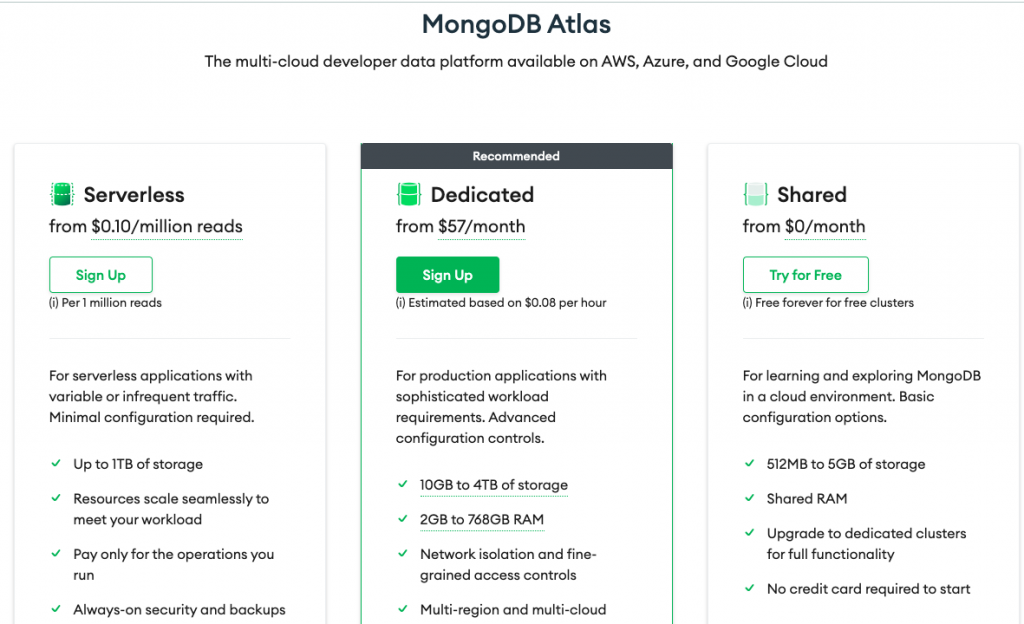
MySQL
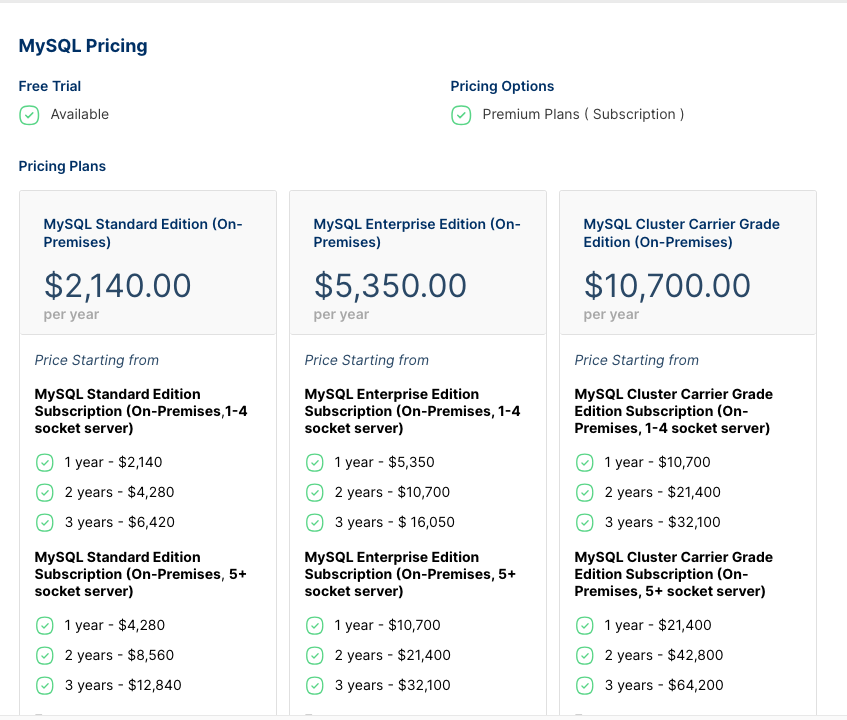
How is MongoDB vs MySQL adapting to emerging technologies like AI and IoT?
Features designed to help the increasing integration of AI and IoT technologies are being added to MongoDB vs MySQL. While MySQL is improving support for time-series data storage and analysis, which is essential for IoT applications, MongoDB Atlas, for instance, has features for real-time analytics and machine learning integrations.
To handle the growing amounts of data produced by AI and IoT devices, both databases are aiming to maximize scalability and performance.
Final Thoughts: Which one should I choose?
This article covers all the main points that a business owner would need to consider to manage their website’s Database. In conclusion, both MongoDB vs MySQL have their strengths and weaknesses when it comes to speed and performance. Because of its distributed architecture and flexible schema design, MongoDB performs exceptionally well in workloads that need a lot of reading. It provides quicker read performance for queries involving document retrieval or aggregation activities.
However, MySQL might perform faster in write-intensive workloads because of its strong indexing mechanisms and support for complex relational operations, especially for structured data with well-defined schemas.
The final decision between MongoDB vs MySQL should be made in light of your application’s unique needs and features, as well as aspects like scalability, flexibility, ease of use, pricing, and the availability of features that fit your use case. So Test and see what works for you!
Frequently Asked Questions
What differentiates MongoDB vs MySQL?
MySQL is a structured Relational DBMS, ideal for organized data and complex requests, while MongoDB is a flexible NoSQL database designed for scalability and unstructured data management.
Which database is better for my e-commerce project, MongoDB vs MySQL?
Looking at both prospects of what is best for your project will depend on its specifications. MongoDB might be a better option if your e-commerce platform handles unstructured or semi-structured data, like product descriptions or customer reviews, and needs great scalability to manage growing data quantities and traffic.
However, choose MySQL if your e-commerce platform depends a lot on structured data, including orders from customers, inventory control, and financial transactions, and needs complex queries with transactions to guarantee data integrity.
What are the cost implications of using MongoDB vs MySQL?
While MongoDB Enterprise Edition and managed services like MongoDB Atlas are licensed under commercial terms, MongoDB Community Edition is available for free and is open-source.
Both are available through MySQL, with licensing fees determined on server instances and features.
What are the future trends: MongoDB vs MySQL?
MongoDB: Enhanced support for distributed computing, machine learning, and cloud-native architectures.
MySQL: Focus on scalability, performance, security, and hybrid cloud deployments.
MongoDB vs MySQL: Common Uses
Both have different real-world uses, following are some examples:
MongoDB:
Content Management Systems (CMS)
E-commerce platforms
Real-time analytics applications
Mobile app backends
Internet of Things (IoT) platforms
MySQL:
Financial systems
Customer Relationship Management (CRM) software
Enterprise Resource Planning (ERP) systems
Online transaction processing (OLTP) applications
Data warehousing solutions



